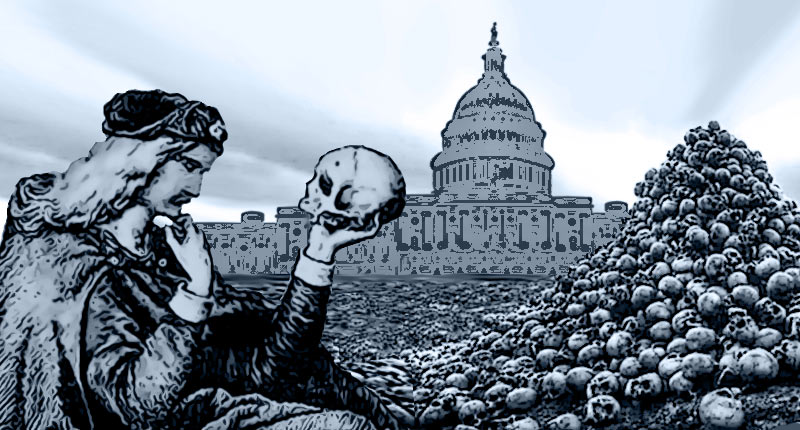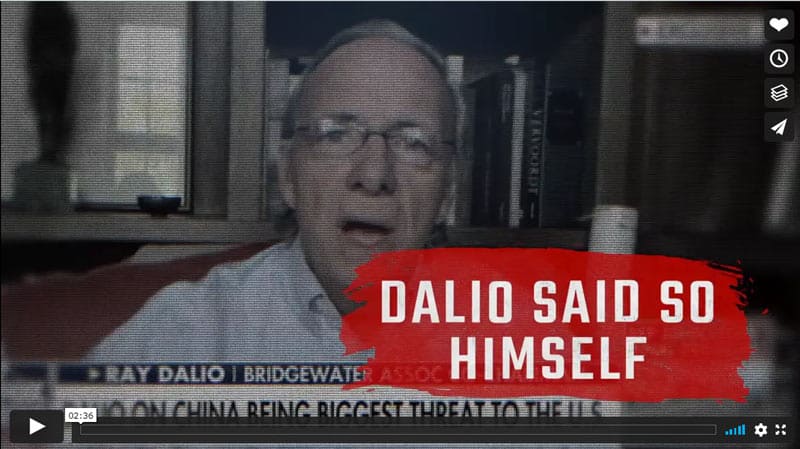Hamlet’s Truth

By J.R. Nyquist | July 25, 2020
Give me that man that is not passion’s slave, and I will wear him in my heart’s core, ay, in my heart of heart.
HAMLET, ACT 3, SCENE 2
On 10 June 1859, at the Royal Princess’s Theatre in London, Charles Kean played the lead role in Shakespeare’s Hamlet, Prince of Denmark. He wrote a laudatory preface for the play, characterizing it as “the most stupendous monument of Shakespeare’s genius, standing as a beacon to command the wonder and admiration of the world….” It constituted, according to Kean, “the perfection of tragic art — the grand, the pitiful, and the terrible.” Kean interpreted the play as “a history of mind — a tragedy of thought” containing “the deepest philosophy, the most profound wisdom; yet speaks the language of the heart….”
Adding to what Kean says, Shakespeare’s brilliance lies in the dramatic presentation of life’s recurring dilemmas: the calamity of wicked government, the treachery of the envious, the primacy of virtue and the blindness of fools. Whatever story Shakespeare tells, it is always our story.
Today it may be argued that Shakespeare’s Hamlet has special significance; for it poetically grapples with the tragedy of a country subverted by intrigue, overthrown by secret conspiracy, seduced by false appearances, and corrupted by a desire not to see.
Hamlet’s backstory goes like this: The young Danish prince was away, studying at the University of Wittenberg, when his uncle Claudius murders his father, marries his mother and usurps the crown. On returning home, Hamlet is deeply troubled by his father’s death and his mother’s fast-track marriage to his uncle. In the desperate intrigues that follow, Hamlet searches for the truth. He encounters false friends, useful idiots and unwitting pawns. He has reason to be disillusioned by what he finds, and that disillusionment becomes a problem all its own.
Many of the best lines in this play might be used to describe the present day. The corruption of American political life finds its expression in Shakespeare’s character, Marcellus, who famously says, “Something is rotten in the state of Denmark.”
Consider the parallel story of a retired CIA official I recently spoke with. She did not notice the slide into corruption until, like Hamlet, she returned from abroad. At first she was “shocked” by what she discovered. Then she was disillusioned, and then depressed.
“I spent four dreadful years in Texas,” she told me, “but didn’t really know what I was up against there.” The intelligence officials she encountered — especially those in authority — were not impressive. “They all had impressive degrees, of course, which they liked to throw around, but … it was difficult to get anything done.” As she further recounted:
Nobody was prepared to listen to me, or the other few conservatives I knew there. Arrogant, dismissive, and childish are the descriptions that most come to mind. Gone [were] the days when people were truly interested in honing analytic skills. It’s all political now.
A latter-day Hamlet, who wanted to survive in the intelligence community of today, would have to feign madness — would have to hide behind an impenetrable mask. Failing that, a CIA prince of Hamlet’s sensitivity and worth, would be rudely dealt with — pushed to resign, or forced to sit at a small corner desk with a meaningless assignment.
“I discovered the true and increasingly political nature of the IC (Intelligence Community),” she explained. The obstacles placed in her way were far from trivial. The rot, she noted, has spread beyond the intelligence community into the military, which “has been corrupted, too —
mainly because the Colonels (and many generals) of today have been indoctrinated by the left since they were in kindergarten. I’ve seen a dramatic shift from right to left (sense to nonsense) since I [had contact with the military side].
If Hamlet was unable to solve the problem of a corrupt Danish state, could he have done any better with the rottenness at Langley and the Pentagon? Is there a cure for the ideological cancer eating away at our security state?
“I do not think our intelligence services can be fixed,” she replied. Years earlier she thought the problems could be addressed, “but I sincerely doubt it now. It would take someone like Trump, only with more power to dissolve the entire system, to do anything constructive.” She further explained:
Unfortunately, the Intelligence Community has become so ensconced within the larger system that even if it were dissolved and resurrected, it would only come back with the same people….
She thought President Trump might dismantle “the bureaucracies one-by-one … rebuilding them without the partisan bias.” But how was this ever practicable? Perhaps the answer was to build the successor organizations concurrently, before the full dissolution of existing agencies. “This, of course, is almost impossible,” she admitted, “and a ‘pie-in-the-sky’ approach, regardless.”
This situation, like that of Shakespeare’s play, can only have a tragical end. The rotten something in the state of Denmark cannot be fixed. The plot is untangled only by the natural end toward which all wickedness and stupidity tends. Fending off one intrigue after another, Hamlet takes the approach we will inevitably take. He waits for his enemy’s final act of aggression, knowing he is at a disadvantage, yet bravely resolved. “We defy augury,” Hamlet tells Horatio:
…there’s a special providence in the fall of a sparrow. If it be now, ‘tis not to come; if it be not to come, it will be now; if it be not now, yet it will come: the readiness is all; since no man has aught of what he leaves, what is’t to leave betimes?
It is true, perhaps, that we are “sicklied o’er with the pale cast of thought” — only because this characterizes our spiritual preparation for the enemy’s final act of aggression. People write books about the evils of communism, about the left’s takeover of the schools, the government, big business, entertainment and the media. What does anyone ever do to stop the communists? Decade after decade they advance. Everyone looks the other way. Those who saw this happening have always been alone in their knowledge, without support from the country or the government. Those who see and understand are carriers of Hamlet’s truth.
At the end of Act 1, Scene 5, Hamlet says, “The time is out of joint. O cursèd spite, / That ever I was born to set it right!” Hamlet must depose a deceptive, cunning and murderous enemy — whose chief method is conspiracy, who jealously guards the power he has taken; a “damned villain” who has seduced Hamlet’s mother, and has the loyalty of the bureaucrats (Lord Polonius). It is a seemingly hopeless predicament. Thus, disillusionment gives way to depression:
To be, or not to be, that is the question: Whether ’tis nobler in the mind to suffer / The slings and arrows of outrageous fortune, / Or to take arms against a sea of troubles / And by opposing end them.
How does one “take up arms against a sea of troubles”? The decisive word here is “faith.” Trust in Providence. Virtue prevails in the end not because the good always win and evil always loses. Virtue prevails because Truth is eternal. Think of that champion of the Republic, Marcus Cicero, whose severed head and hands were displayed by Marcus Antonius to terrorize the party of freedom. Yet think how, 18 centuries later, John Adams carried Cicero’s words with him, every step of the way, through the American Revolution.
The eloquence of virtue, after 18 centuries, was not used up. It was not defeated. It was and is and is to come. Such was the final triumph of Hamlet the Dane — who found the truth and lived by it.
SHARE IT WITH THE WORLD




